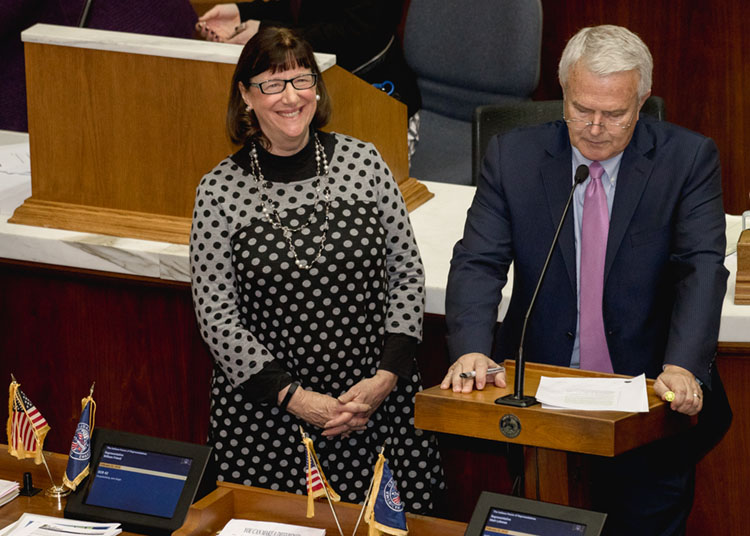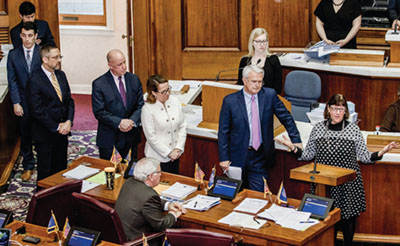
By Justin P. Forkner | Executive Director, Indiana Office of Court Services
Legacy. What is a legacy? It’s planting seeds in a garden you never get to see.”
—Hamilton: An American Musical, by Lin-Manuel Miranda
Jane Seigel officially retired on April 30, after 19 years of service to the Indiana Supreme Court. To Lin-Manuel Miranda’s point, the garden of reforms, outcomes, and initiatives Jane has planted will doubtless bear fruit and benefit Hoosier courts and citizens for generations to come. And we, as beneficiaries of that garden, must commit ourselves as caretakers to its maintenance and continued growth. But with no disrespect intended to Mr. Miranda, I can also say with absolute confidence that Jane’s legacy is already in full bloom across our state.
To begin with, Jane has been a leader in developing Indiana’s judicial branch education system. When she first took the reins as Executive Director of the Indiana Judicial Center (IJC) in 1998, the whole of Indiana’s educational programming spanned 44 days and targeted only judicial officers, probation officers, and court alcohol and drug program personnel—just over 2,900 personnel attended the IJC’s programming that year.
But as the Indiana Supreme Court expanded the reach of its initiatives and policies, Jane guided the IJC to expand its educational programming as well.
And by 2017, the system delivered 254 days of education—through centralized, regional, local, and online training—to 8,721 judicial officers, probation officers, court office and clerk staff members, alcohol and drug program personnel, problem-solving court team members, and criminal justice partners and stakeholders. IJC has, under Jane’s watch, become a first-class educational system envied across the country.
Jane has been a leader within the Judicial Conference of Indiana too, helping guide its Board of Directors and nearly 40 Supreme Court Committees to be Indiana’s engines for modernizing judicial practice and policy.
With her steady hand, these bodies have pushed forward on paths in line with the overall mission of the Supreme Court and Judicial Conference. Their efforts have put Indiana at the forefront of momentous reforms, especially in the areas of juvenile and criminal justice.
For example, Jane was a key player in Indiana’s Juvenile Detention Alternatives Initiative (JDAI) as a way to reduce the number of juveniles placed in local detention centers, and JDAI programs now operate in 32 sites around Indiana. Indiana’s probation officers now use validated risk assessment tools to inform sentencing decisions, identify service needs, and guide supervision strategies.
Jane also chaired the Justice Reinvestment Advisory Council for two years, overseeing implementation of criminal code initiatives and guiding a multiagency approach to changing offender behavior and making Hoosier communities safer.
Working through the Judicial Conference and with the Indiana General Assembly, Jane led improvements to jury pool lists that presented a more representative cross-section of Hoosiers in every jury trial.

In addition, she helped give jurors common-sense tools for carrying out the vital functions of hearing and weighing evidence, and supported plain English revisions to Indiana’s jury instructions.
In sum, thanks to Jane’s leadership, Indiana’s justice system is more fair, more evidence-based, and more accessible to the Hoosiers who participate in its processes.
Most recently, Jane was charged by the Court to help develop and lead a comprehensive reorganization of the Court’s administrative structure, with the aim of creating more efficient and sustainable operations. Jane succeeded, merging the Indiana Judicial Center and Division of State Court Administration into the current Indiana Office of Court Services (IOCS).
As the first Executive Director of IOCS, Jane has facilitated the blending of roles, responsibilities, personnel, and facilities into a lasting, flexible organization capable of meeting old missions and prepared to face new, future challenges.
All of this is well and good.
But as someone who has been lucky enough to spend most of the last two years at Jane’s side, I can personally attest that Jane’s legacy will go far beyond any courthouse walls. Her most valuable legacy, I believe, is in her grace, dignity, and humor in pursuing those reforms; in leading the agencies and committees. It is in her modeling how to be strong and a friend even in times of disagreement.
It is a reminder to us to pause, reflect, and consider the impact of an act before we do it. It is in instilling fundamental civility and decency into difficult conversations, in empathy for the feelings and needs of others, and in a willingness to take a person as you find them and as they are—not as you wish they would be. It is in showing the joy inherent to empowering others’ success as professionals and people.
Jane’s lasting legacy then is both a gift to us and an obligation for us to respect and carry forward. She has reformed our court systems and our ways of thinking. She has led us, taught us, and lifted us up. And she has, through her personal service and sublime humanity, given all of us the seeds necessary to start planting the gardens of our own legacies.
Thank you, Jane.